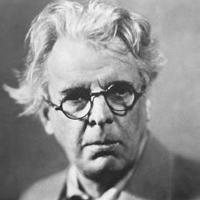The Scholars by William Butler Yeats: Summary
This little piece of poetry is split into two stanzas with equal number of lines. Bald heads are the scholars, whose scholarly conducts have been ridiculed in this poem. They are 'forgetful of their sins'. Whatever wrongs they do are forgotten by them because, ironically, they are 'bald by amassing knowledge by deep and long study.

William B. Yeats (1865-1939)
The speaker of the poem is outward front the group of scholars, or he assumes that because lovers' position in love making has been promoted to a higher degree than the position of scholars. He repeats with emphasis that these scholars are, 'old, learned, respectable 'bald heads,' but ironically, they wear shoes of others; that is, they do nothing on their own. They do not know practically human values of love. Their learning is of no use and, as the speaker comments in the second stanza, they shuffle there (walk in air) and they cough in ink. They edit and annotate the lines of love songs that the young men sing in love's despair, that are to flatter beautiful beloveds' ears. The speaker is trying to say that the so-called old, learned, respectable bald heads do not create anything of their own, but yet dominate the real creators with their pretensions that they really know much about the creations and they have power of knowledge to edit and annotate them. The second stanza is bitter to digest, at least for the scholars. In the first four lines, there is 'all' repeated at the beginning of the lines. It is called anaphora.
'All shuffle there: all cough in ink;
All wear the carpet with their shoes;
All think what other people think
All know the man their neighbour knows.
In all these above lines, the speaker's personal prejudices are dominant. The First line gives the sense of the speaker's disgust, hatred, and disturbed passion towards the scholars. Ink is the means of expressing one's view, ideas, feelings, etc. In that case, the lovers also cough in ink because they also express their songs of passions in ink.
The last two lines imply the self-assumption that Catullus, a first-century Latin poet, notable for his passionate love poems, had not gone that way. He raises a question what would people say If Catullus had walked on the track of others? To justify this final remark, the speaker has taken many false premises.
The poem contains simple words. They have fewer syllables. The lines have eight syllables except in fifth, sixth and eleventh lines which have six, nine and five syllables respectively. The lines have rhymes. Technically, the first four lines of each stanza seem to have end rhymes alternatives, but the last two lines have regular rhymes. Yet same lines do not follow the rhyming scheme, such as 'sins’ of the first line does not rhyme with 'lines' of the third line. Similarly, 'shoes' does not rhyme with 'knows'. However, as the lines are shorter, movement is felt very smooth and regular. Rhythmic effect also can be felt in the poem.
Cite this Page!
Sharma, K.N. "The Scholars by William Butler Yeats: Summary." BachelorandMaster, 31 Aug. 2014, bachelorandmaster.com/britishandamericanpoetry/the-scholars-summary.html.
Related Topics
The Scholars: Literary Analysis
The Scholars: Critical Analysis
Sailing to Byzantium: Analysis
The Theme of Immortality in Byzantium Poems
A Prayer for My Daughter: Analysis
Among School Children: Analysis
Crazy Jane Talks with the Bishop
The Lamentation of the Old Pensioner
He Wishes for the Clothes of Heaven
An Irish Airman Foresees his Death
When You Are Old: Summary and Analysis
William Butler Yeats as a Symbolist
Truth of Human Life in Yeats's Poetry
Yeats and the Romantic Tradition
The Salient Features of Yeats's Poetry
Biography of William Butler Yeats
 |
bachelorandmaster.com |